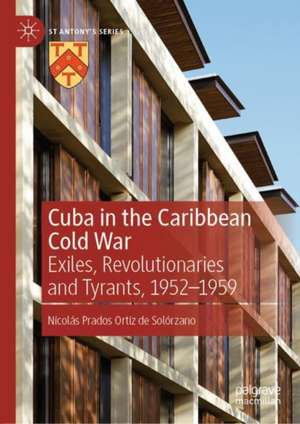Cuba in the Caribbean Cold War: Exiles, Revolutionaries and Tyrants, 1952-1959: St Antony's Series
Autor Nicolás Prados Ortiz de Solórzanoen Limba Engleză Hardback – 10 iun 2020
Din seria St Antony's Series
- 18%
 Preț: 895.27 lei
Preț: 895.27 lei - 18%
 Preț: 891.33 lei
Preț: 891.33 lei -
 Preț: 304.38 lei
Preț: 304.38 lei - 15%
 Preț: 647.27 lei
Preț: 647.27 lei - 15%
 Preț: 519.88 lei
Preț: 519.88 lei - 9%
 Preț: 900.53 lei
Preț: 900.53 lei - 20%
 Preț: 939.87 lei
Preț: 939.87 lei - 18%
 Preț: 687.07 lei
Preț: 687.07 lei -
 Preț: 263.29 lei
Preț: 263.29 lei -
 Preț: 391.22 lei
Preț: 391.22 lei - 15%
 Preț: 644.18 lei
Preț: 644.18 lei -
 Preț: 338.31 lei
Preț: 338.31 lei - 15%
 Preț: 646.62 lei
Preț: 646.62 lei - 15%
 Preț: 640.37 lei
Preț: 640.37 lei - 15%
 Preț: 639.04 lei
Preț: 639.04 lei - 15%
 Preț: 643.48 lei
Preț: 643.48 lei - 15%
 Preț: 643.34 lei
Preț: 643.34 lei - 15%
 Preț: 640.55 lei
Preț: 640.55 lei -
 Preț: 389.11 lei
Preț: 389.11 lei - 15%
 Preț: 641.20 lei
Preț: 641.20 lei - 15%
 Preț: 639.08 lei
Preț: 639.08 lei - 15%
 Preț: 640.71 lei
Preț: 640.71 lei - 18%
 Preț: 1384.88 lei
Preț: 1384.88 lei - 15%
 Preț: 641.85 lei
Preț: 641.85 lei - 15%
 Preț: 642.83 lei
Preț: 642.83 lei - 15%
 Preț: 643.99 lei
Preț: 643.99 lei - 15%
 Preț: 647.27 lei
Preț: 647.27 lei -
 Preț: 390.08 lei
Preț: 390.08 lei - 18%
 Preț: 783.50 lei
Preț: 783.50 lei - 15%
 Preț: 641.03 lei
Preț: 641.03 lei - 18%
 Preț: 943.88 lei
Preț: 943.88 lei - 15%
 Preț: 641.85 lei
Preț: 641.85 lei - 15%
 Preț: 641.38 lei
Preț: 641.38 lei -
 Preț: 385.47 lei
Preț: 385.47 lei -
 Preț: 338.31 lei
Preț: 338.31 lei -
 Preț: 389.31 lei
Preț: 389.31 lei - 15%
 Preț: 641.03 lei
Preț: 641.03 lei - 18%
 Preț: 727.00 lei
Preț: 727.00 lei - 15%
 Preț: 640.88 lei
Preț: 640.88 lei -
 Preț: 448.82 lei
Preț: 448.82 lei - 18%
 Preț: 946.24 lei
Preț: 946.24 lei - 15%
 Preț: 641.53 lei
Preț: 641.53 lei - 15%
 Preț: 642.51 lei
Preț: 642.51 lei -
 Preț: 389.88 lei
Preț: 389.88 lei - 15%
 Preț: 643.00 lei
Preț: 643.00 lei - 15%
 Preț: 639.25 lei
Preț: 639.25 lei - 18%
 Preț: 948.61 lei
Preț: 948.61 lei
Preț: 418.83 lei
Nou
Puncte Express: 628
Preț estimativ în valută:
80.15€ • 83.37$ • 66.17£
80.15€ • 83.37$ • 66.17£
Carte tipărită la comandă
Livrare economică 15-29 aprilie
Preluare comenzi: 021 569.72.76
Specificații
ISBN-13: 9783030463625
ISBN-10: 3030463621
Pagini: 113
Ilustrații: XIII, 113 p. 2 illus., 1 illus. in color.
Dimensiuni: 148 x 210 mm
Greutate: 0.36 kg
Ediția:1st ed. 2020
Editura: Springer International Publishing
Colecția Palgrave Macmillan
Seria St Antony's Series
Locul publicării:Cham, Switzerland
ISBN-10: 3030463621
Pagini: 113
Ilustrații: XIII, 113 p. 2 illus., 1 illus. in color.
Dimensiuni: 148 x 210 mm
Greutate: 0.36 kg
Ediția:1st ed. 2020
Editura: Springer International Publishing
Colecția Palgrave Macmillan
Seria St Antony's Series
Locul publicării:Cham, Switzerland
Cuprins
Chapter 1. Introduction: The Caribbean Legion Revived.- Chapter 2. A Caribbean Cold War, 1947-1955.- Chapter 3. The Internationalization of the Cuban Revolution, 1955-1956.- Chapter 4. The Caribbean Legion supplying the Sierra Maestra, 1957-1958.- Chapter 5. Conclusion: The Demise of the Caribbean Legion, 1959-1961.
Recenzii
“This book opens a unique and pivotal avenue for understanding the Cuban Revolution and the international dynamics that made it possible. Resting on a rich set of overlooked Cuban sources … Nicola´s Prados Ortiz de Solo´rzano’s book provides a tremendous contribution … . Embracing a much-needed transnational approach, this volume resurrects the crucial role of the Caribbean Legion … . this book successfully forwards a new account of the Cuban Revolution.” (Rafael Pedemonte, Hispanic American Historical Review, Vol. 101 (4), 2021)
Notă biografică
Nicolás Prados Ortiz de Solórzano is a doctoral candidate in History at the University of Oxford, UK. He is currently investigating the relationship between democracy and transnational revolutionary networks operating in Latin America and the Caribbean from the mid-1940s to the early 1960s.
Textul de pe ultima copertă
This book argues that during the Cuban Revolution (1952–1958), Fidel Castro, his allies, and members of the Movimiento 26 de Julio tapped into a larger network of transnational revolutionaries who sought to overthrow the region’s dictatorships. With his research in multiple archives including those in Cuba, Prados offers a new, transnational perspective on conflicts over dictatorship and democracy, which shaped the Caribbean in the decades that followed World War II. The book traces the roots of the ‘Caribbean Legion’, a transnational network of anti-dictatorial revolutionaries, before detailing how Castro and many of his allies in exile exploited this web during the struggle against Fulgencio Batista. Contacts in this network provided the Cuban revolutionaries with crucial military, financial, and diplomatic support from the democratic governments of José Figueres in Costa Rica, and Rómulo Betancourt in Venezuela, entangling the Cuban revolutionaries in a larger regional struggle between democratic regimes and military dictatorships. This transnational involvement shaped the revolutionary regime of 1959 and had far-reaching repercussions for the larger geopolitical dynamics in the region, and for the Cold War as a whole.
Nicolás Prados Ortiz de Solórzano is a doctoral candidate in History at the University of Oxford, UK. He is currently investigating the relationship between democracy and transnational revolutionary networks operating in Latin America and the Caribbean from the mid-1940s to the early 1960s.
Nicolás Prados Ortiz de Solórzano is a doctoral candidate in History at the University of Oxford, UK. He is currently investigating the relationship between democracy and transnational revolutionary networks operating in Latin America and the Caribbean from the mid-1940s to the early 1960s.
Caracteristici
Explores the revolutionary network known as the Caribbean Legion Analyzes previously unavailable Cuban sources, as well as British, American, and Spanish archives Pursues a transnational approach, showing Cuban revolutionaries’ close ties with rebels throughout the Caribbean
